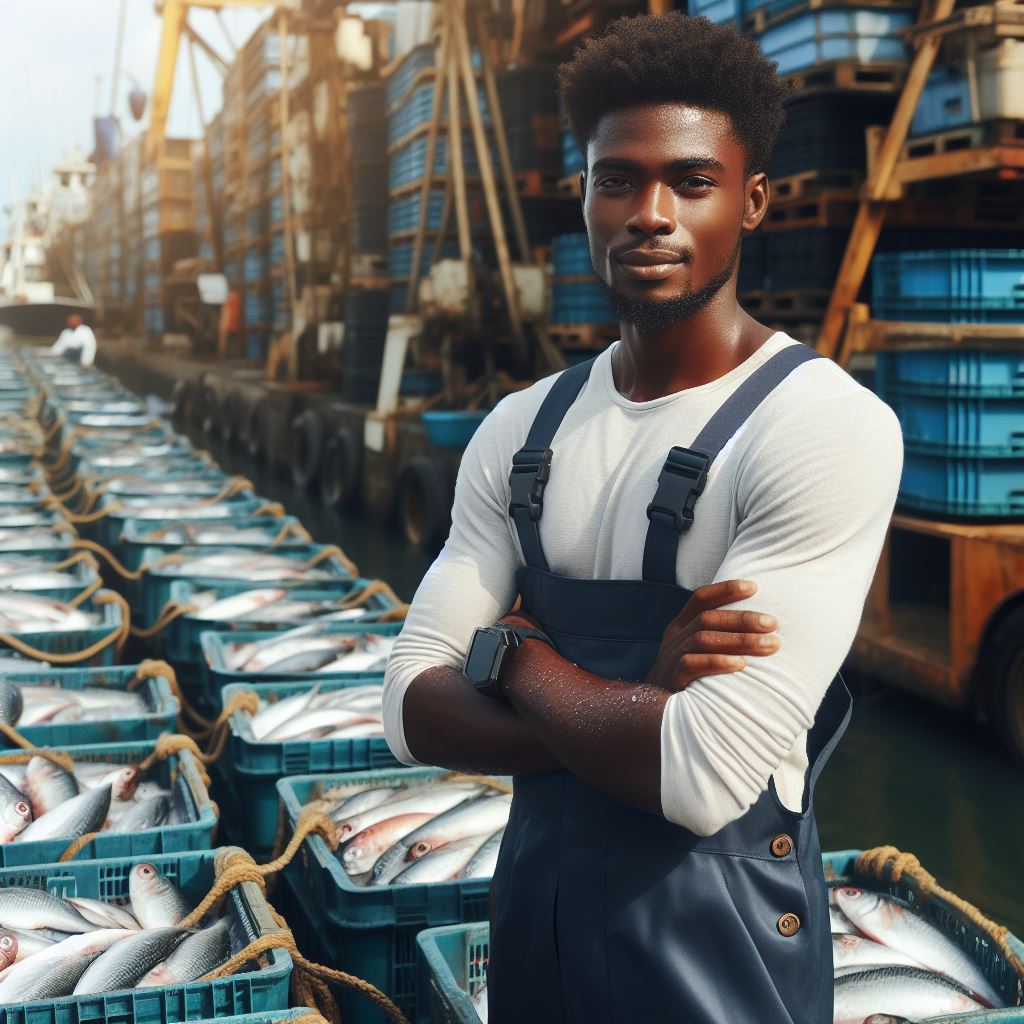Introduction
Nigeria Fisheries Global Partnerships: In this blog post, we will explore collaborative projects and their importance in Nigeria’s fisheries sector.
Collaborative projects involve partnerships between different organizations or countries to achieve common goals.
In Nigeria’s fisheries sector, global partnerships can play a vital role in promoting sustainable fishing practices, improving the quality of fish products, and boosting economic growth.
The key points we will discuss include the benefits of collaborative projects in the fisheries sector, such as knowledge sharing, capacity building, and technology transfer.
We will also explore the challenges faced by Nigeria in establishing global partnerships, such as limited financial resources and the need for regulatory frameworks.
Additionally, we will examine successful examples of global partnerships in the country’s fisheries sector, highlighting the positive impact they have had on the local fishing communities and the economy.
By promoting collaboration and partnerships, Nigeria can enhance its fisheries sector and address challenges such as overfishing, illegal fishing, and depletion of fish stocks.
Global partnerships offer opportunities for resource-sharing, joint research, and sustainable practices that can benefit both Nigeria and its international partners.
Through this blog post, we hope to raise awareness about the importance of collaboration in the fisheries sector and inspire further efforts in establishing global partnerships for Nigeria’s sustainable development.
Nigeria’s Fisheries Sector
Brief overview of Nigeria’s fisheries industry
Nigeria’s fisheries industry plays a crucial role in the country’s economy as it is a major source of food and employment.
It contributes significantly to the livelihoods of coastal communities and supports economic growth.
Nigeria, being a coastal country blessed with vast marine resources, has a thriving fisheries sector.
This industry holds considerable importance for Nigeria’s economy, contributing significantly in terms of food security and employment generation.
The fisheries sector not only provides a source of livelihood for thousands of coastal communities but also serves as an engine for economic growth and development.
Challenges faced by the sector
However, despite its potential, Nigeria’s fisheries sector faces several challenges that threaten its sustainability and growth.
One of the most pressing issues is overfishing and the dwindling fish stocks.
With increasing demand for fish products and limited regulations, overfishing has become a common practice, leading to a decline in fish populations.
This not only negatively affects the ecosystem but also the livelihoods of those dependent on fishing.
Another significant challenge is the lack of modern fishing equipment and technologies.
Many Nigerian fishermen still use traditional and outdated fishing methods, which are not only inefficient but also harmful to marine ecosystems.
The absence of advanced equipment hampers the productivity and profitability of the sector, making sustainable and responsible fishing practices difficult to achieve.
Furthermore, poor infrastructure and inadequate storage facilities hinder the development of Nigeria’s fisheries industry.
Insufficient infrastructure, such as cold storage facilities and processing units, leads to significant post-harvest losses, compromising the quality and market value of fish products.
Faced with inadequate transportation facilities and trade barriers, Nigerian fishermen struggle to reach potential buyers, both domestic and international.
This limits their income potential and prevents the sector from fully capitalizing on the global demand for fish products.
To address these challenges, collaborative projects focusing on Nigeria’s fisheries sector should prioritize sustainable fishing practices.
This includes implementing regulations and quotas to prevent overfishing and allow fish stocks to replenish.
Investments in modern fishing equipment and technologies should also be made to enhance productivity and reduce the environmental impact of fishing activities.
Furthermore, improving infrastructure and storage facilities is essential to preserve the quality of fish products and reduce post-harvest losses.
This requires building cold storage units and processing facilities in strategic locations, enabling fishermen to properly store and process their catch.
Finally, enhancing market access and export opportunities is crucial for the growth of Nigeria’s fisheries sector.
Read: Emerging Trends in Nigerian Fisheries Research and Study
Importance of Collaborative Projects
Collaborative projects are vital for Nigeria’s fisheries sector as they bring numerous benefits.
Strengthening scientific research and knowledge exchange
These projects facilitate the strengthening of scientific research and the exchange of knowledge among different stakeholders.
The collaboration between local researchers, international experts, and industry players leads to the advancement of scientific research related to fisheries.
Technology transfer and capacity building
Technology transfer is another crucial aspect of collaborative projects.
By working with global partners, Nigeria can acquire advanced technologies and practices to enhance the efficiency of its fisheries sector.
This technological advancement not only improves the productivity of fishermen but also contributes to the capacity building of local stakeholders.
Through such collaborations, Nigeria can develop its capabilities and build a skilled workforce that can sustain the growth of its fisheries industry.
Market access and export opportunities
Collaborative projects also expand market access and create export opportunities for Nigeria.
Transform Your Career with Expert Guidance
Get personalized mentorship consulting that’s tailored to your unique path. Our expert advice is actionable and exclusive.
Get StartedBy partnering with international stakeholders, the country can tap into global markets for its fishery products.
This increased market access leads to higher demand and improved economic benefits for local fishermen and fish farmers.
Collaborations facilitate the exchange of market information, trade protocols, and best practices, enabling Nigerian fisheries to meet international standards and expand their customer base.
Sustainable management and conservation of fishery resources
Sustainable management and conservation of fishery resources are crucial for the long-term viability of Nigeria’s fishery industry.
Collaborative projects promote the development of sustainable management strategies that ensure the protection and conservation of fishery resources.
By sharing expertise and experiences, countries can adopt best practices in resource management, such as implementing fishing regulations, monitoring practices, and conservation measures.
These collaborations contribute to the preservation of fish stocks and the overall health of Nigeria’s aquatic ecosystems.
Job creation and economic growth
Furthermore, collaborative projects play a significant role in job creation and economic growth.
As Nigeria’s fisheries sector expands through collaborations, it creates employment opportunities across various stages of the value chain.
Not only do fishermen and fish farmers benefit, but additional jobs are also generated in processing, packaging, distribution, and marketing.
This job creation leads to increased income and improved living standards for local communities.
Moreover, the growth of the fisheries industry contributes to the overall economic development of the country.
In fact, collaborative projects are of utmost importance for Nigeria’s fisheries sector.
They strengthen scientific research, facilitate technology transfer, improve market access, promote sustainable resource management, and drive job creation and economic growth.
To harness these benefits, Nigeria should actively engage in partnerships, both regionally and globally, to leverage shared knowledge, resources, and expertise.
Through collaborative efforts, Nigeria can unlock the full potential of its fisheries industry, ensuring sustainable development and prosperity for the nation.
Read: Fisheries Curriculum: Key Courses to Expect in Nigeria

Explore Further: Why Study Agricultural Admin in Nigerian Institutions?
Discover More: Importance of Wildlife Management to Nigerian Economy
Delve into the Subject: Role of Biotechnology in Nigerian Plant Breeding
You Might Also Like: Funding Opportunities for Pasture Management Projects in Nigeria
Examples of Successful Collaborative Projects
Collaborative projects in Nigeria’s fisheries sector have proven successful, particularly through partnerships with international research institutions and joint ventures with foreign companies.
Partnership with international research institutions
A key example of successful collaboration is Nigeria’s partnership with international research institutions. This collaboration involves the sharing of scientific data and research findings.
By pooling resources and knowledge, Nigerian scientists and fisheries experts can access valuable information from their international counterparts.
This exchange of data and findings contributes to a better understanding of Nigeria’s fisheries resources and their sustainable management.
Additionally, international research institutions provide training opportunities for Nigerian scientists and fisheries experts.
This helps to enhance their skills and expertise in various areas of fisheries science, such as stock assessment, marine biology, and ecosystem dynamics.
Through these training programs, Nigerian professionals can stay updated with the latest research methodologies and techniques, ultimately benefiting the country’s fisheries sector.
Another successful collaborative project is Nigeria’s joint ventures with foreign companies.
These partnerships bring in modern fishing techniques and equipment, which significantly improve the efficiency of fishing operations.
By adopting innovative methods, Nigerian fishermen can enhance their catch rates while minimizing the impact on fish stocks and the marine environment.
Joint ventures with foreign companies
Moreover, foreign companies in these joint ventures contribute to improving fish processing, packaging, and storage methods.
Advanced technologies and quality control measures are introduced, resulting in better preservation and presentation of fish products.
This not only enhances the overall quality of Nigerian fish products but also extends their shelf life, allowing for wider distribution and market access.
Access to international markets and export opportunities is another significant benefit of these joint ventures.
Foreign companies provide valuable market connections and expertise, assisting Nigerian fisheries in expanding their reach beyond national boundaries.
By meeting international standards and regulations, Nigerian fish products can be exported and sold in various countries.
This opens up new avenues for revenue generation and economic growth in the fisheries sector.
In short, Nigeria’s fisheries sector has seen successful collaborative projects through partnerships with international research institutions and joint ventures with foreign companies.
These partnerships enable the sharing of scientific data, research findings, and training opportunities, contributing to improved fisheries management and expertise.
Joint ventures bring modern fishing techniques, equipment, and international market access, which enhance the efficiency, quality, and economic prospects of Nigeria’s fisheries industry.
Read: Impact of Cultural Practices on Consumer Sciences in Nigeria
See Related Content: Training Programs for Nigerian Livestock Farmers
Challenges and Opportunities for Nigeria
Collaborative projects in Nigeria’s fisheries sector present both challenges and opportunities.
As Nigeria seeks to develop its fisheries industry through international partnerships, it must address potential hurdles that may impede progress.
Potential challenges in collaborative projects
Cultural differences and language barriers can significantly impact collaborative efforts. In Nigeria, where diverse ethnic groups exist, understanding and respecting different cultures is crucial.
Effective communication between local stakeholders and foreign partners is essential.
Language barriers can hinder the exchange of knowledge, ideas, and best practices.
Collaborators must invest in language training and cultural sensitivity programs to bridge these gaps.
Moreover, legal and regulatory issues may pose obstacles to collaborative initiatives.
Nigeria’s fisheries sector operates under various laws and regulations aimed at preserving marine resources and protecting the rights of local communities.
Ensuring alignment between local regulations and international standards is necessary to avoid conflicts and legal complexities.
Collaborators must navigate legal frameworks and establish clear guidelines to facilitate cooperative ventures.
Another critical challenge lies in ensuring equitable distribution of benefits.
Collaborative projects often involve multiple stakeholders, including government bodies, local communities, and international organizations.
Fairly distributing benefits and minimizing potential inequalities is essential for long-term success.
Collaborators must work toward creating frameworks that address social and economic disparities while ensuring sustainable development.
Despite these challenges, numerous opportunities emerge from collaborative projects. One opportunity is the exploration of aquaculture development projects.
Aquaculture can diversify Nigeria’s fisheries industry and reduce pressure on natural fish stocks.
Collaborators can partner to develop environmentally friendly and economically viable aquaculture techniques, creating new income streams for local communities and meeting the growing demand for seafood.
Strengthening regional partnerships within Africa is another avenue for collaboration. Nigeria can learn from neighboring countries’ experiences and share its own expertise in fisheries management.
By pooling resources and knowledge, regional partnerships can enhance governance, combat illegal fishing, and promote sustainable practices.
Collaborative initiatives can also provide political support for collective actions, ensuring long-term benefits for the entire African continent.
Opportunities for further collaboration
The fisheries sector in Nigeria also offers opportunities for foreign direct investment (FDI).
Collaborators can attract FDI by showcasing the sector’s potential and the government’s commitment to creating an enabling environment for investors.
FDI can bring in advanced technologies, expertise, and funding that can enhance the country’s fishing infrastructure, improve fish processing techniques, and boost export capacities.
However, careful consideration should be given to environmental sustainability and the preservation of local fishing communities’ livelihoods.
In essence, collaborative projects present both challenges and opportunities for Nigeria’s fisheries sector.
Overcoming cultural differences, addressing legal complexities, and ensuring equitable distribution of benefits are critical to successful collaboration.
Exploring aquaculture, strengthening regional partnerships, and attracting foreign direct investment can unlock new avenues for growth.
By navigating these challenges and capitalizing on opportunities, Nigeria can maximize the benefits of global partnerships in its fisheries industry’s sustainable development.
Read: Career Paths After Studying Nutrition Sciences in Nigeria
Discover More: Digital Platforms for Livestock Market in Nigeria
Uncover the Details: Educational Programs for Nigerian Horticulture
Conclusion
Collaborative projects play a crucial role in Nigeria’s fisheries sector by fostering knowledge exchange, enhancing capacity building, and promoting sustainable development.
Several successful partnerships have already yielded positive results in Nigeria’s fisheries sector, such as the collaboration between local fishermen and international organizations to improve fishing techniques and support responsible practices.
Additionally, potential opportunities for collaborations exist in areas like aquaculture development and research.
It is essential for all stakeholders, including government agencies, NGOs, researchers, and local communities, to actively promote and support collaborative projects in Nigeria’s fisheries sector.
This can be done through funding, knowledge sharing, resource allocation, and policy support.
By working together and leveraging global partnerships, Nigeria can address pressing challenges in its fisheries sector, such as overfishing, lack of infrastructure, and inadequate technical expertise.
Collaboration is key to ensuring the sustainability and economic viability of Nigeria’s fisheries industry.




